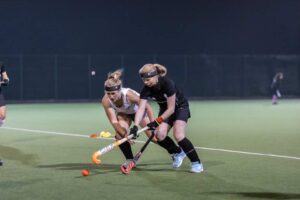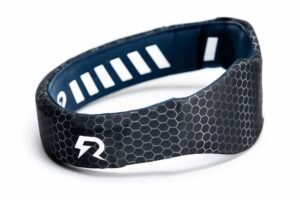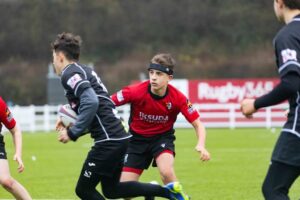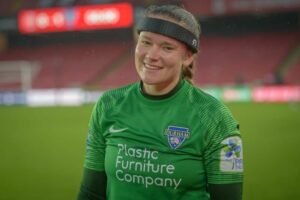Hundreds of millions of people around the world – probably more – play various sports at different levels. When it comes to contact sports such as rugby, football and hockey, this ranges from male and female professional athletes right through to young girls and boys playing at school. There are certainly more females now enjoying playing football and rugby, and the numbers will continue to grow. The recent success of the England Lionesses have been a massive inspiration for many girls to get into football. Whether it is a game on television, or attending a match in person at any level – anybody reading this article can recall players going for a ball resulting in a clash of heads, both often needing treatment. Players wear shin pads to protect legs, and gum shields for teeth – but do we take enough care to protect the brain, which once injured can have a devastating immediate affect, or indeed in later year’s. We had a very interesting Outbound b2b call with Judith McMinn, CEO of Rezon Ltd, whose company have produced a ground-breaking protective sports headband.
We know from speaking with you personally how passionate you are about your products, with your goal to get awareness of the brain protection it offers to market. What is the backstory with Rezon, how did it come about?
 I played hockey at school, and wondered why we protected our shins and teeth in sport, but not the brain? That question remained with me for 30 years until I did something about it in 2020. When I looked for brain protection products in the market, I found only scalp and skull protection products existed, so there was the gap and I decided to create a meaningful brain protection solution. I founded Rezon, (pronounced Ree-zon) as an engineer of change and thought leader around innovation in sports headgear and assembled an expert team with the leading insights across brain health, biomechanical physics, material science, garment design and manufacturing. To develop brain protection requires 1) an understanding of the physicality of the brain to rotational forces (the forces cause the brain to rotate inside the skull, shear brain cells, tear blood vessels and cause uncontrolled inflammation which damages the brain, and increases the risk of longer-term neurodegenerative consequences) and 2) the mechanics of brain injury from sub-concussions (small force impacts which are 500 times more frequent than a concussion). I developed Halos, a protective all-sports headband to protect the brain. Halos has patented Rotection technology (a design of nine layers of protection) that reduces rotational forces by up to 61% in head impacts. Reducing rotational forces is significant because of the high number of sub-concussions sustained in sports (a player will likely receive thousands each season and many thousands in a career) Reducing rotational forces from each sub-concussion from wearing Halos will lessen the risk of longer-term neurodegenerative consequences. Halos rethinks what makes for effective brain protection and shifts the assumptions on head-worn protection from helmets and scrum caps. It is the world’s lightest and thinnest brain protective. It is award winning by achieving PPE product innovation of the year, and ground-breaking as the first non-helmeted sports headgear to achieve Personal Protection Equipment (PPE) CE certification.
I played hockey at school, and wondered why we protected our shins and teeth in sport, but not the brain? That question remained with me for 30 years until I did something about it in 2020. When I looked for brain protection products in the market, I found only scalp and skull protection products existed, so there was the gap and I decided to create a meaningful brain protection solution. I founded Rezon, (pronounced Ree-zon) as an engineer of change and thought leader around innovation in sports headgear and assembled an expert team with the leading insights across brain health, biomechanical physics, material science, garment design and manufacturing. To develop brain protection requires 1) an understanding of the physicality of the brain to rotational forces (the forces cause the brain to rotate inside the skull, shear brain cells, tear blood vessels and cause uncontrolled inflammation which damages the brain, and increases the risk of longer-term neurodegenerative consequences) and 2) the mechanics of brain injury from sub-concussions (small force impacts which are 500 times more frequent than a concussion). I developed Halos, a protective all-sports headband to protect the brain. Halos has patented Rotection technology (a design of nine layers of protection) that reduces rotational forces by up to 61% in head impacts. Reducing rotational forces is significant because of the high number of sub-concussions sustained in sports (a player will likely receive thousands each season and many thousands in a career) Reducing rotational forces from each sub-concussion from wearing Halos will lessen the risk of longer-term neurodegenerative consequences. Halos rethinks what makes for effective brain protection and shifts the assumptions on head-worn protection from helmets and scrum caps. It is the world’s lightest and thinnest brain protective. It is award winning by achieving PPE product innovation of the year, and ground-breaking as the first non-helmeted sports headgear to achieve Personal Protection Equipment (PPE) CE certification.
Our conversation was mainly centred around wearing the headgear in football, but clearly there is a need in the contact sports of rugby and hockey as well. Are there any other sports, or circumstances, which could benefit from this technology?
 Halos is the most inclusive product in sport, with no distinction made on gender, skill level, geography, or game, whether it’s netball, rugby or football. Halos is sport agonistic because whatever the sport or level of play, head impacts e.g. head to ground, head to knee, head to ball, head-to-head all create brain injury, with increased risk of negative cognitive, psychiatric and mental health outcomes, including suicide. Every head impact puts every sport player’s ambition, hopes and dreams at risk. This is because rotational forces are present in every concussive and sub-concussive impact. So brain protection is relevant to every sport where head impacts occur. Rezon Halos entered the market in February 2022 and is being used as far east as Hong Kong, south as Sydney Australia, west as Los Angeles and north as Dundee. Across ten sports, worn by both professional and amateur players across genders and across ages. Halos is also being prepared for integration into helmets, focussing on construction, equestrian and ski helmets.
Halos is the most inclusive product in sport, with no distinction made on gender, skill level, geography, or game, whether it’s netball, rugby or football. Halos is sport agonistic because whatever the sport or level of play, head impacts e.g. head to ground, head to knee, head to ball, head-to-head all create brain injury, with increased risk of negative cognitive, psychiatric and mental health outcomes, including suicide. Every head impact puts every sport player’s ambition, hopes and dreams at risk. This is because rotational forces are present in every concussive and sub-concussive impact. So brain protection is relevant to every sport where head impacts occur. Rezon Halos entered the market in February 2022 and is being used as far east as Hong Kong, south as Sydney Australia, west as Los Angeles and north as Dundee. Across ten sports, worn by both professional and amateur players across genders and across ages. Halos is also being prepared for integration into helmets, focussing on construction, equestrian and ski helmets.
Rezon is a UK company and all products are manufactured here, which is excellent. However it is very much a global brand. Tell us more.
 We are indeed a County Durham based company and we manufacture in Yorkshire, with an all-British supply chain. But we are a global brand! Our forward order book is building, and we are working on closing off further distributor deals in UAE and northern Europe. Developing our working partnerships and relationships with the leading brain medical clinic in the UK, with over a thousand independent schools, and with the leading educational body to raise awareness on women’s health are generating sales traction in the UK and building up awareness of our offering wider. We are also developing Halos beyond protection and into brain injury detection and performance monitoring. With exclusivity to leading EEG nanotechnology from US brain healthcare company Cogwear, we are incorporating this technology into the Halos headband. This wearable will aid the detection of elevated risk of brain injury through monitoring rotational forces to the brain, alerting on sub-concussions and when “safe” thresholds on rotational forces are breached. Meaning more informed insight around return to play post-concussion and sub-concussions. Also, the EEG technology into Halos will shift performance in sport from being below the neck to what determines performance – the brain. The EEG technology will record brain activity and provide clinical-grade and unbiased measures and insights around player Engagement, Distraction, Focus, Fatigue and other human performance indicators. Truly game-changing!
We are indeed a County Durham based company and we manufacture in Yorkshire, with an all-British supply chain. But we are a global brand! Our forward order book is building, and we are working on closing off further distributor deals in UAE and northern Europe. Developing our working partnerships and relationships with the leading brain medical clinic in the UK, with over a thousand independent schools, and with the leading educational body to raise awareness on women’s health are generating sales traction in the UK and building up awareness of our offering wider. We are also developing Halos beyond protection and into brain injury detection and performance monitoring. With exclusivity to leading EEG nanotechnology from US brain healthcare company Cogwear, we are incorporating this technology into the Halos headband. This wearable will aid the detection of elevated risk of brain injury through monitoring rotational forces to the brain, alerting on sub-concussions and when “safe” thresholds on rotational forces are breached. Meaning more informed insight around return to play post-concussion and sub-concussions. Also, the EEG technology into Halos will shift performance in sport from being below the neck to what determines performance – the brain. The EEG technology will record brain activity and provide clinical-grade and unbiased measures and insights around player Engagement, Distraction, Focus, Fatigue and other human performance indicators. Truly game-changing!
We see on the rezonwear.com website that you are offering schools this technology, and encouraging juniors who play sport to wear the protection. How vital is it to have young sports players wearing your products from an early age?
 Children under 12 who suffer from head impacts grow up to be cognitively disadvantaged. Even if they do not develop a neurodegenerative disease, they still have a lower IQ, under-achieving by 30 – 40% in numeracy and reading, which is quite sobering. So, it’s important to educate parents and children on protecting their brains before they reach an age where they can make their own choices. Children have less myelin than adults. This is problematic because myelin protects the brain cells-axons. Axons with little myelin are more exposed and prone to damage from concussions and sub-concussions. Less myelinated axons also don’t recover as well from injury as highly myelinated axons. This means a child is more vulnerable to brain trauma in sports. Children’s brains undergo noticeable changes after just one season of head impacts, even if they were never diagnosed with a concussion. Unfortunately, people don’t understand the brain as well as they understand other parts of the body, and take it for granted. If you can get new teeth and leg, but not a new brain, where is the logic in wearing a gumshield or shin guard over Halos?
Children under 12 who suffer from head impacts grow up to be cognitively disadvantaged. Even if they do not develop a neurodegenerative disease, they still have a lower IQ, under-achieving by 30 – 40% in numeracy and reading, which is quite sobering. So, it’s important to educate parents and children on protecting their brains before they reach an age where they can make their own choices. Children have less myelin than adults. This is problematic because myelin protects the brain cells-axons. Axons with little myelin are more exposed and prone to damage from concussions and sub-concussions. Less myelinated axons also don’t recover as well from injury as highly myelinated axons. This means a child is more vulnerable to brain trauma in sports. Children’s brains undergo noticeable changes after just one season of head impacts, even if they were never diagnosed with a concussion. Unfortunately, people don’t understand the brain as well as they understand other parts of the body, and take it for granted. If you can get new teeth and leg, but not a new brain, where is the logic in wearing a gumshield or shin guard over Halos?
What is the mission in the next two – five years. What is the plan for Rezon?
To challenge sports to take the science around brain health more seriously. And through Rezon giving every sports player a protective choice so that in their 20s, 30s, 40s and 50s, they no longer have to face the potential outcome of neurodegenerative diseases like CTE.
